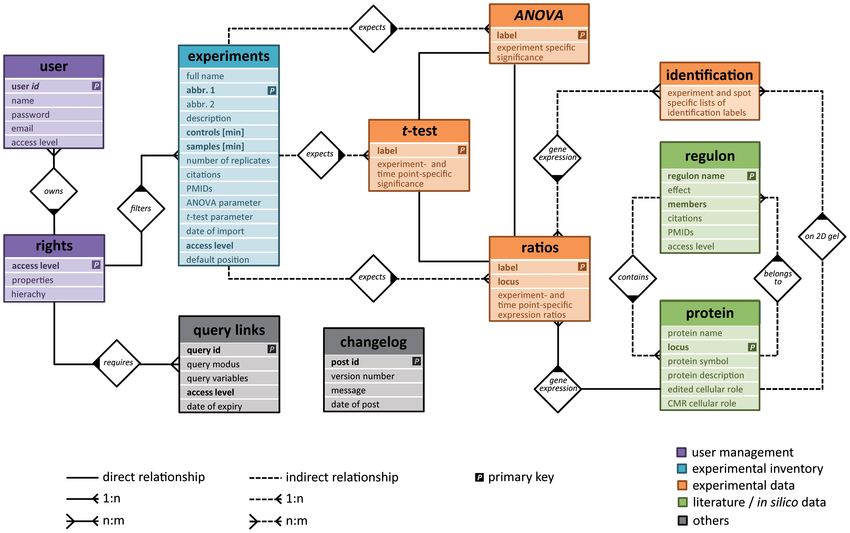Top 10 Powerful Data Modeling Tools

1. ER/Studio
ER/Studio is a powerful data modeling tool from Idera that lets you efficiently catalog your current data assets and sources across different platforms. It can also build and share data models, as well as track end-to-end data lineage. With ER/Studio, organizations can quickly understand the interaction between their data, processes, and people.
Key Features of ER/Studio:
- Accommodates both logical and physical designs
- Ensures that models and databases are consistent
- Allows for scripting and automation
- Runs an impact analysis for new modifications at the database level
- HTML, PNG, JPEG, RTF, XML, Schema, and DTD are all supported display formats
2. Erwin Data Modeler
Erwin is another popular data modeling tool that can create logical, physical, and conceptual data models. It is considered one of the best tools out there to help you create the actual database from the physical model. It is also known for its low-cost but robust business solutions.
Key Features of Erwin Data Modeler:
- Allows business and technical users to collaborate, maintain, and simulate models from a central location
- Compares the model and database automatically
- Allows you to pull data from CRM, ERP, and other sources for effective modeling
- Synchronizes the forward and reverse engineering of data definition code
- Features a graphical interface that is simple to use
3. DbSchema Pro
DbSchema Pro is a powerful database design and graphical user interface tool for schema documentation. It also enables you to share and deploy schemas on relational and NoSQL databases.
Key Features of DbSchema Pro:
- Independent of conceptual and logical designs
- Allows you to create queries with various ordering, grouping, filters, and joins
- Produces test data using reverse regular expressions and specified patterns
- Allows you to look at and change data from a variety of tables using foreign keys
4. Archi
Archi is a popular data modeling tool among enterprise architects. It is a cost-effective solution to analyze, describe, and visualize the database architecture for a variety of business sectors. It is an open-source and cross-platform tool that can be scaled with the help of plugins.
Key Features of Archi:
- Provides dynamic views to alter the ArchiMate viewpoint at any moment
- Offers a hints view that allows you to quickly access element information
- Shows the selected model element and all of its connections with other model components in a radial-tree visual
- Allows you to build and customize your canvas
5. SQL Database Modeler
SQL Database Modeler allows you to construct SQL databases where you can import and build SQL scripts. It supports MS SQL Server and MySQL and can collaborate with a group from any location. The user-friendly interface makes it easy to create and change tables.
Key Features of SQL Database Modeler:
- Contains various view modes
- Allows both forward and reverses engineering
- Allows projects to be converted from MS SQL Server to MySQL and vice versa
- Allows users to collaborate on projects
- Has a versioning feature that produces a new version of a project every time you save it. Any version can be rolled back to and be seen at any time and from anywhere
- Allows you to share projects and their versions
6. Lucidchart
Lucidchart is a collaborative online data modeling tool for creating database diagrams. You do not have to download any bulky software; it is cloud-based and the updates are instantaneous. It also has a Lucidchart app for Android and iOS that is compatible with all three main operating systems and can be used on any mobile device.
Key Features of Lucid:
- Contains a large number of sophisticated features
- Provides a good choice for architectural schematics
- Supports MySQL, Oracle, SQL Server, PostgreSQL, and lots more
- Easy to navigate interface with a plethora of information assets
7. PgModeler
PgModeler is an open-source data modeling tool that gives developers extensive access to its source code. It has a light interface developed for the PostgreSQL database system.
Key Features of PgModeler:
- Generated columns and restrictions automatically
- Supports XML files
- Can create models using existing databases
- All prior work is restored in the case of an event failure
8. IBM InfoSphere Data Architect
IBM InfoSphere Data Architect is one of the best data modeling tools out there that can simplify and accelerate data integration design for business intelligence. It helps to align the services, applications, data architectures, and processes of an organization.
Key Features of IBM InfoSphere Data Architect:
- Provides rapid and easy development
- Helps to understand data assets to improve efficiency and reduce time to market
- Automatically discovers the structure of heterogeneous data sources
- Allows integration with related products such as data studio
9. DTM Data Modeler
DTM Data Modeler is designed for database developers and supports both forward and reverse engineering. It helps you to work with logical and physical data models.
Key Features of DTM Data Modeler:
- Provides known entity-relationship modeling notation
- Supports IDAPI, ODBC, Oracle, or OLE DB interface
- Supports the DB2 database and Microsoft SQL Server database
- Has editors for stored procedures, triggers, and indexes
10. MagicDraw
Magic draw is the first comprehensive data modeling tool for professional modeling. It is used for high-demand databases that require modern design and clear layouts.
Key Features of MagicDraw:
- Can be run in various applications once purchased
- Provides floating licenses to help you save more if you have multiple developers that need to use MagicDraw
- Constantly adds new features based on feedback given by users
- Offer 24 hours free support
Visita nuestro homepage




